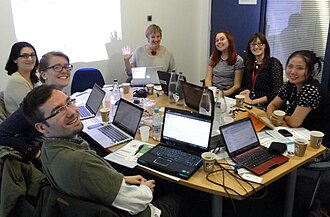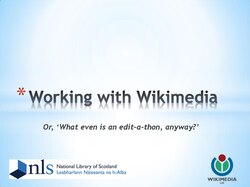Working with Wikimedia workshop, Edinburgh
|
About the event
Since July 2013, when the National Library of Scotland launched their Wikimedian in Residence programme, there has been a massive increase in the number of Wikimedia supported events held in collaboration with galleries, libraries, archives, or museums (GLAM organisations). This workshop is designed to introduce staff from the cultural sector and other related areas such as education to Wikimedia events like edit-a-thons, backstage pass events, and photo expeditions. Learn how you can work with Wikimedia (that means Wikipedia, Wikimedia Commons, Wikisource, and more!) to share your material and your knowledge with a regular audience of millions, and how you can contribute to a growing a nation-wide Scottish open knowledge movement by bringing together interested local participants, experts, and material to show Wikipedia users from across Scotland and around the world what your organisation has to offer.
The event aims to make connections with staff members from organisations interested in working with Wikimedia but who do not currently have an ambassador, Wikimedian in Residence, or committed volunteer from the Wikimedia community to help them put together events like those organised at the National Library of Scotland and the Royal Society of Edinburgh.
- How do I prepare?
- Sign up for the event
- Create a Wikipedia account (optional)
- Bring a laptop (wi-fi will be provided)
- Learn about editing if you like: see the tutorial, or Getting started on Wikipedia article for more information
- Look at examples of previous GLAM-Wiki events in Scotland and elsewhere in the UK:
- Anybody but Burns Edit-a-thon with Scottish Poetry Library
- Royal Society of Edinburgh/Medical Research Council Women in Science Edit-a-thon
- Scottish Women on Wikipedia Edit-a-thon with Glasgow Women's Library
- Ada Lovelace Day Edit-a-thon 2012, London
- Wikipedia Takes Coventry photographic scavenger hunt, 2012
- The Royal Birmingham Society of Artists Backstage Pass Tour, 2012
- Refreshments will be provided
Programme
- 13:30-14:00 – Tea and coffee (optional)
- 14:00-14:15 – Welcome and introductions
- 14:15-14:45 – Wikimedia GLAM events- what are they, how do they work?
- 14:45-15:30 – Open discussion: supporting Wikimedia events
- 15:30-15:45 – Refreshment break
- 15:45-16:30 – Breakout groups: what would help, potential barriers
- 16:30-17:00 – Conclusion: open discussion and feedback
Attendees
If you are attending and you have created a Wikipedia account, please add your username to the list below:
Links and useful information
There are a lot of policies and guidelines on Wikipedia and other Wikimedia projects which can make contributing or even collaborating daunting or confusing; however, below are a selection of links to articles and pages that help explain the most important things to know quickly and clearly. Check them out first before wading any deeper!
- Ten Simple Rules for Editing Wikipedia - Does what it says on the tin: offers a clear set of ten rules that will make editing Wikipedia less overwhelming. Also available to download as a PDF
- Wikipedia for Galleries, Libraries, Archives, and Museums - A clear introduction to GLAM-Wiki collaboration aimed at outlining the nature of Wikimedia and institution partnerships as well as some of the how-to's for editing and advice for incorporating Wikimedia into an organisation's workflow.
- Advice for the cultural sector - A more extensive introduction to working with Wikimedia specifically aimed at cultural organisations. Includes practical introductions to editing Wikipedia as well as a list of both positive and negative interactions between Wikimedia and the cultural sector.
- Wikimania London, 2014 - More information about Wikimania 2014, the massive conference, unconference, festival, meetup, workshop, hackathon, and party, spread over five days in August 2014. Full programme, list of fringe events, and registration details. Don't forget, early bird registration ends June 15th!
- Treeviews tool - Find out the monthly statistics for the category trees relevant to your organisation or interests.
- Edit-a-thons
- Edit-a-thon How To - This page offers an initial introduction to organising and running an edit-a-thon, and gives some feedback from Wikimedians who have successfully run edit-a-thons in the past
- How to run an Edit-a-thon - More detailed guidelines to organising an edit-a-thon; also includes an extensive (though by no means complete) list of previous edit-a-thons held since 2011
- Introduction to Edit-a-thons - This page captures an approach to hosting events that are primarily Wikipedia edit-a-thons, but begin with a more structured introductory session. Very useful for edit-a-thons that will consist primarily or entirely of new users, and many tips for presenters on how to offer Wikipedia training.
- Wikimedia Photo Scavenger Hunts
- Photo scavenger hunts - This page offers information on organising a Wikimedia photo scavenger hunt from outlining the structure through to technical considerations and publicising in the Wikimedia community as well as in the media.
- Organising a "Wiki Takes" event - This page includes instructions to help organizers plan a "Wiki Takes..." event, similar to a photo scavenger hunt. This page also includes some case studies showcasing successful past events and possible unique variations on the traditional event format. These instructions are not rules, but rather, flexible guidelines to give you ideas on planning your event.
- Wikipedia Takes Your City - some general guidelines to organising a "Wiki Takes"-style event, with a number of links to examples and case studies.
- Backstage pass events
- Case study: Smithsonian Institution's "Archives of American Art" backstage pass event - Information on the 2011 event held in Washington, D.C. Outlines the planning and organisation process, experience of running the event itself, and reflections after the fact.
- Event page for "Archives of American Art" backstage pass event - The event page for the "Archives of American Art" event has been preserved to give an example of what such an event might look like and what has been successful in the past.
- Article on Smithsonian backstage pass event - This article covers the Smithsonian's backstage pass and gives an example of the goals of this type of event, its ideal impact on Wikipedia, and the possible media response.
- Working with Wikipedia: Backstage Pass at the Powerhouse Museum - This blog post offers a very insightful look at a Backstage Pass event from a GLAM's perspective - why they collaborated, what they hoped to achieve, and how they think things went.
Notes from the workshop
Potential barriers/concerns (solutions in italics):
- Edits from events reverted (marking edits as part of events can help avoid this, as will the support from experienced trainers)
- Striking the right balance between new contributors and experienced editors (Support from Wikimedia UK to ensure the right ratio of trainers to new users)
- Getting the timing/schedule right
- Finding time for preparation or research in advance (tying in to existing events or exhibitions can minimise the extra work required and can generate greater interest)
- Scale and audience -
- too broad, no substance = no defined audience (find a middle ground and work with opportunities that present themselves, don't force an unnecessary event)
- too narrow, not enough material or interest = audience too small (working with existing groups is ideal: local history groups, university societies, volunteer groups, etc)
- Finding support within the organisation - making a case (outline benefits of GLAM:Wiki collaboration, impact of existing collaborations)
- How to manage expectations of the event from both sides (have a clear vision of what you want to achieve, but be flexible and let your participants have some say in what happens)
- Anonymity of Wikipedia: how does the organisation's involvement follow the content?
Benefits to collaboration:
- Get something different
- New perspective on a collection or exhibition
- Possible new source of information
- Enhance existing events within the organisation's calendar (symposiums, forums, exhibitions)
- Expand the types of groups you work with
- Reach out to new and larger audiences
- Potential for more engaged multimedia response to content
- Using Wikimedia Commons as a means of recording the cultural response to an exhibition or event, giving insight that goes beyond programmes or catalogues
What can I do after the event?
- To keep up to date about Wikimedia events happening throughout Scotland, to learn more about ScotWiki projects, or to publicise your own ScotWiki event or project, join the ScotWiki Mailing List!
- You may find these useful if you want to learn further about editing:
- Why not become a member of Wikimedia UK? You can learn more about membership at https://wiki.wikimedia.org.uk/wiki/Membership

